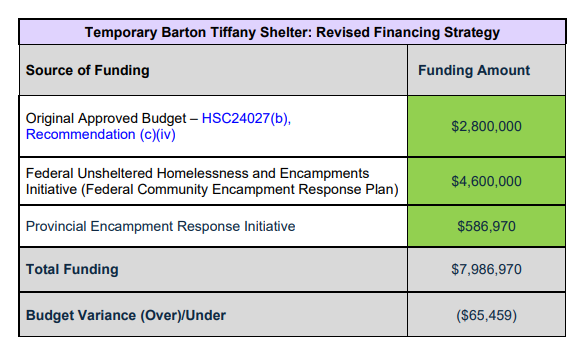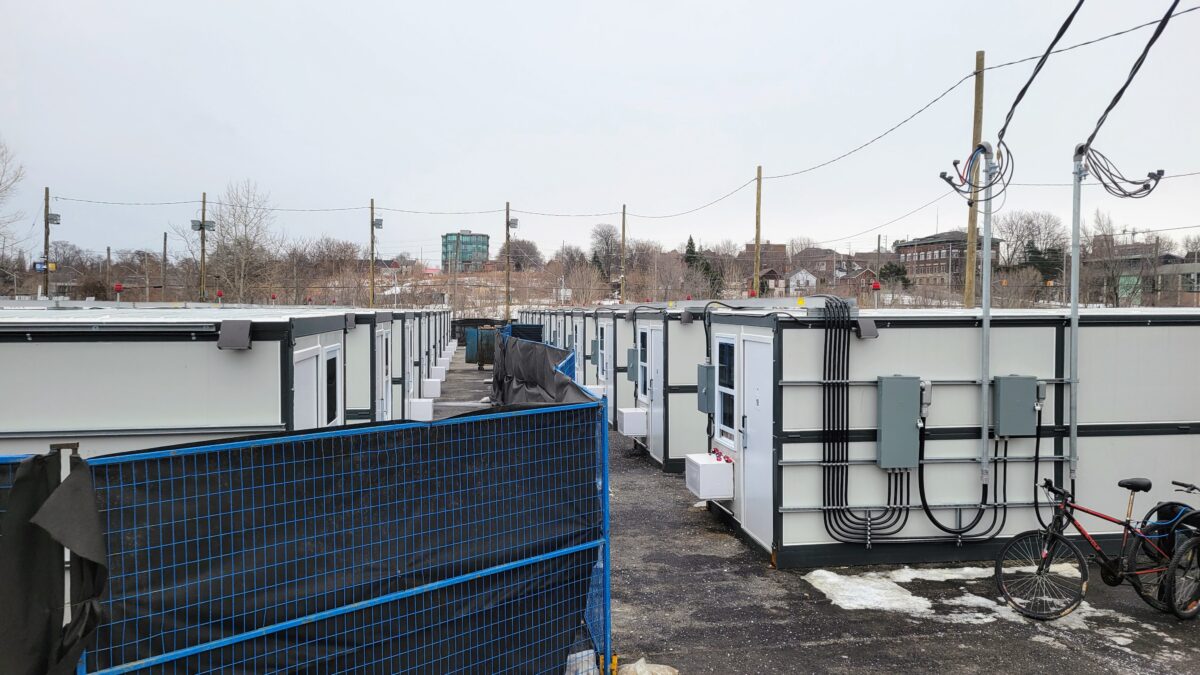The City of Hamilton states that the capital cost to construct the Barton/Tiffany “temporary” outdoor emergency shelter is $7,974,029.
The contaminated former industrial site on Barton Street West was chosen due to the relative isolation of the site, and the ability for the City to quickly install a solid surface soil cap to quickly open the 40-cabin (with a total of 80 beds) shelter.
Cost Breakdown
The City spent $2,432,972 to purchase and install the 40 made-in-China temporary modular housing units, and common buildings including washroom and shower trailers, laundry facilities, and a common portable building.
An additional $239,193 was spent on “Unit modifications to the common building which required structural and accessibility changes to best meet the needs of the shelter program and code requirements.”
In a separate section, the report states that the “shelter units” needed to be rewired to meet Canadian standards set by the CSA.
Planning consultants cost $646,878, and design consultants cost $414,672.
Site construction costs were $4,240,314.
The total capital cost of $7,974,029, which is approximately $100,000 per bed.
Based on the square footage of the living units, the cost is approximately $1281 per square foot.
Annual operating costs are budgeted to be approximately $40,000 per bed.
Council Being Asked to Retroactively Approve Cost Overrun Accounting

The City staff report claims that the project is only $65,459 over budget, stating they used $4,600,000 in federal funding and $586,970 in provincial encampment response funding to cover the $5.1 million of exceeded capital costs.
Council is being asked to retroactively approve the reallocation. Staff write that they will “continue to advocate for coordinated and sustained investment from senior government partners.”
Staff Reasoning for Cost Overruns
The original $2.8-million estimate was “informed by similar small-scale models but did not fully reflect the complexity of developing a site of this nature in an urban setting with a compressed timeframe,” the report states.
“Although the original opening target was December 2024, construction and occupancy timelines were revised in response to the evolving complexity of site conditions, infrastructure requirements, delivery schedules, and regulatory obligations.”
“Contaminated site conditions” increased costs due to “unanticipated grading, servicing, erosion control, and infrastructure installation work.”
Microshelters Inc. Cost Estimate
The staff report includes new details on their decision to make newly incorporated Microshelters Inc. the City’s exclusive supplier of shelters.
Providing shelter to couples and people with pets was the priority. This dictated purchasing 160-square-foot units, rather than the commonly available 80-square-foot units produced by local manufacturers.
The report does not explain how the City of Hamilton entered into its contract with newly incorporated Microshelters Inc., or why the City did not conduct any due diligence on the contract.
Microshelters’ original quote was $1,763,027, with the City agreeing to pay for shipping, taxes, and duties.
The City report does not detail the final amount paid to Microshelters, nor does it specify the amount of shipping and other fees.
Report Does Not Address Third-Party Litigation
City staff do not address the numerous controversies that have engulfed their partner, Microshelters Inc., including the fact that Microshelters misrepresented itself using the intellectual property of the American company Foldum.
Foldum has filed a lawsuit against Microshelters Inc. and Global Axxis in the Superior Court of California.
Foldum alleges the companies conspired to use their proprietary intellectual property and overcharged the City of Hamilton. The accusations have not been tested. The City of Hamilton is not a named party in the suit.
The staff report includes a statement indicating it may litigate against a supplier, without stating which one.
“The City is also actively exploring cost recovery options with Legal Services and Procurement for deficiencies, errors, or unmet contractual obligations.”
City Staff Declare Project Successful
“While capital costs were higher than anticipated, these investments were essential and every adjustment was necessary to ensure safe, timely, and compliant delivery,” the report states, “while also meeting the goal of strengthening the City’s ability to support unsheltered residents and address urgent gaps in the existing emergency shelter system.”
“Delivering this type of shelter required a new and innovative thinking, creative problem-solving, and real-time adaptation at every step in the site activation process.”
Council to Meet Wednesday: Public Engagement Deadline Tuesday at Noon
City Council will meet on Wednesday, April 30, beginning at 9:30 a.m., as the General Issues Committee to debate the report.
Public correspondence can be sent to clerks@hamilton.ca, or delegation requests made on the City website, until 12:00 noon on Tuesday.
Selected Timeline of the Barton / Tiffany Project Fiasco
In August 2024, Mayor Andrea Horwath issued a Directive to create a low-barrier “temporary” outdoor tiny homes community at the Barton and Tiffany lands.
On November 22, 2024, the City Manager’s Office announced that the shelter would open on December 20. In fact, the City had stopped work due to Ministry of Labour enforcement orders.
Work resumed on December 2.
December 19: The City admitted it will not meet its December 20 opening date.
December 21: Microshelter Inc.’s unauthorized use of Foldum’s IP is revealed.
January 12: The middleman company the City is using to deliver the made-in-China units is discovered to be “administratively dissolved” by U.S. officials.
March 27: TPR reports on Foldum’s legal action.
Production Details
v. 1.3.0
Published: April 25, 2025
Last updated: April 25, 2025
Author: Joey Coleman
Update Record
v. 1.0.0 original version
v. 1.1.0 Added Microshelters cost estimate
v. 1.1.1 additional depth on costs.
v. 1.2.0 extensive additions following second review of report. Added background info.
v. 1.3.0 included construction cost


Shocking. I am almost at a loss for words. City hall incompetence is really frightening. Apparently none the decision makers had basic math skills to see how this would end up stiffing we tax payers. Stop the insanity now!
It’s absolutely unbelievable. Both the initial cost and yearly operating budget/cost per bed=person. At $40,000.00 per year it translates to $3,333.33 per month. This money could have been used to subsidize apartment rental with some $ left. It could pay market rent for more than one person. I’m lost for words
How do we keep getting this kind of thing so wrong?
Over budget! Watch how easy the city will solve this problem; raise your taxes.
People have a bottomless barrel of money, so accountability is not required at City Hall.
To show how incompetently comprised the Planning Department is, they argue $4.6M in federal funding & $0.6M in provincial funding reduces the cost overruns. This is still TAXPAYERS money, wastefully spent.
City budgets are increased every year, with no care or concern for how people have to manage and budget; for their own livelihood.
I dare anyone at City Hall to build their own homes with open contracts or a 300% cost overruns. But this too may be easy for them. Just tell their employers they need more money.
Angry and frustrated.
Tell me why all of the offers made by local men and companies in Ontario or refused as the builders of the tiny houses which would have costed a tremendous amount less. Also it would have been supporting more local businesses and they would have arrived a lot faster they would even have been bigger for a lot less the value in having these builders up north build them was tremendous so why were they refused and someone from another country was asked to build them at a great cost not to mention the cost of shipping and it took forever while people were freezing to death.
People need to be outraged. How can the City declare it successful when it’s over budget, mismanaged and the beds have been given to people with no background checks.
52thousand per bed plus maintenance fees and other is ridiculous when me a 63 yr old on cppd has a six yr waitlist for rent geared to income housing will be dead first
I don’t care what kind of spin you put on it, this entire project has been a failure.
The fact that you were incapable of buying and producing these units locally, while putting that money back into our local economy. You weren’t exactly building the Taj Mahal and Canadians have been building for our weather for over 150 years.
Then you have to retrofit to our standards because building codes never crossed your minds?
You should all be fired.
Food for thought…..
Simple math says that $8,000,000 : (40) shelters = $200,000 per shelter
A room in a decent motel is in the $79.99 / night range.
Thus $200,000 : $79.99 = 2,500 nights
Therefore $8M would cover (40) fully serviced motel rooms for 2500 days
Or buy the entire motel…..twice for that money.
The city needs to be held accountable for all misconduct and misinformation. The site was deemed toxic years ago . Whoever is in development and infrastructure, planning are accountable. Obviously planning had not done their due diligence as far as sampling, cost for upgrading and the costs moving forward. Unbelievable! For those that do not know. City Hall is still not working in house and we the tax payer are fronting this. It takes a minimum of 2 weeks for emails to be processed and answered, meanwhile other planning is back logged. We as a City need to demand full disclosure and a complete copy of the City’s accounting, receipts and salaries.
Terrible misuse of funds. $7.9 Millon could have been used to address the root causes of homelessness.
Now the headline is going to be how City Hall can’t even function. Every thing about Barton- Tiffany has been a failure.
Most of all individuals living there are exposed to environmental contaminants and still don’t have permanent stable housing.